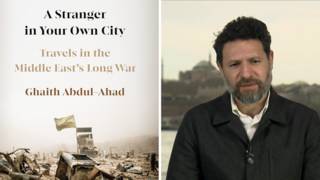
Topics
Guests
- Jonathan Steelelongtime Guardian journalist and author of Defeat: Losing Iraq and the Future of the Middle East.
President Obama is sending Secretary of State John Kerry to the Middle East to help build a regional coalition against the Islamic State, or ISIS, the militant group that has seized large parts of Iraq and Syria. “We don’t have a strategy yet,” Obama admitted. We speak to journalist Jonathan Steele, author of “Defeat: Losing Iraq and the Future of the Middle East.” Steele says that at this point he believes ISIS represents a “marginal threat” on Western interests and that airstrikes will be counterproductive.
Transcript
AMY GOODMAN: Jonathan Steele, I wanted to switch gears a bit, moving on to Iraq. You’re also the author of the book, Defeat: Why America and Britain Lost Iraq. On Thursday, President Obama announced he plans to send Secretary of State John Kerry to the Middle East to help build a regional coalition of allies to ISIL.
PRESIDENT BARACK OBAMA: I’ve asked Secretary Kerry to travel to the region to continue to build the coalition that’s needed to meet this threat. As I’ve said, rooting out a cancer like ISIL will not be quick or easy, but I’m confident that we can and we will, working closely with our allies and our partners. For our part, I’ve directed Secretary Hagel and our Joint Chiefs of Staff to prepare a range of options. I’ll be meeting with my National Security Council again this evening as we continue to develop that strategy.
AMY GOODMAN: Again, that’s President Obama saying they’re trying to build regional allies against the Islamic State. Can you talk about what’s happening there? A lot has been made of President Obama speaking yesterday at the White House, saying that he hasn’t developed a strategy yet.
JONATHAN STEELE: Well, obviously, the murder and beheading of James Foley the other day was an appalling thing and the treatment of other captives, as you mentioned, the waterboarding and so on by Islamic State. But the crucial point to remember in all this is the main threat that Islamic State poses is to other Muslims, to other Arabs, particularly to the Shia. So, to heighten this and turn them into a—as though they are Osama bin Laden’s campaign against the West under al-Qaeda is wrong and can lead to terrible consequences of mistaken Western policy. This is a threat to the region. It’s only marginally a threat to Western interests. So, that should be the first point.
The second point is that military strikes by the West are not likely to be effective in the long term. And again, as we’ve seen in many places—Iraq, Libya, Afghanistan—they tend to be counterproductive and only create more recruits for the enemy you’re trying to deal with. Where I think that Obama is right is if he’s sending Kerry to the region, particularly to Saudi Arabia, to tell them that to do something about all this Wahhabi fundamentalist ideology, which is pumped out from Saudi Arabia, and the money that is going perhaps from private hands, not from Saudi government hands, to these atrocious militants in the ISIS, that would be good, because that is the best way to cut off funding and sourcing. And then the arming of the other rebels by Qatar, and it used to be by Turkey, but that now seems to have stopped, would also be helpful. But any kind of major U.S. role in military terms would be a disaster.
AMY GOODMAN: And is there any difference in the approach of Britain right now?
JONATHAN STEELE: Well, Britain is hesitating, because, as you remember, last year, when there was talk of airstrikes against Syria because of the chemical weapons issue, the British Parliament voted against that, and so Cameron suffered a humiliating defeat. He realizes now that he can only take military action if he has parliamentary approval, and it’s not at all clear he would get it. So, even though Obama seems to want some sort of coalition of the willing and was hoping Australia and Britain would at least join it in the first instance, I think Britain is quite leery of that. And, of course, Cameron is facing an election in less than a year’s time, and he knows the British public opinion is firmly against any military action in Syria by Britain, because, of course, this would be against the Assad regime. If the Assad regime was in cooperation with the West, that would be one thing. But it would still be counterproductive, I think. But if they go in, as Obama perhaps might do, against the wishes of the Assad regime, then, essentially, the U.S. is invading yet another Middle Eastern country.
AMY GOODMAN: Jonathan Steele, we want to thank you for being with us, former Moscow correspondent for The Guardian, author of Eternal Russia: Yeltsin, Gorbachev, and the Mirage of Democracy, and also author of the book, Defeat, about Iraq and Britain, Defeat: Why America and Britain Lost Iraq.
This is Democracy Now! When we come back, we go to Chicago to speak with Congressmember Luis Gutiérrez. A hundred forty-five people got arrested in Washington protesting immigration policy, or the lack thereof. Stay with us.













Media Options